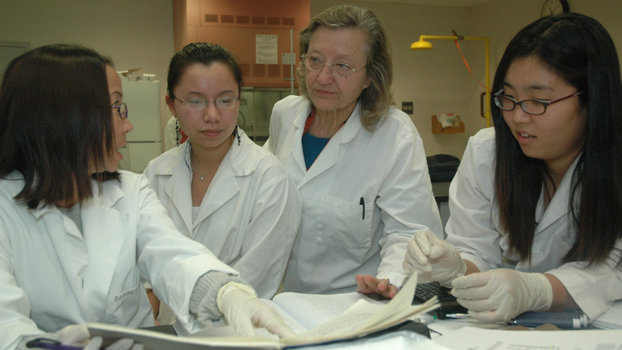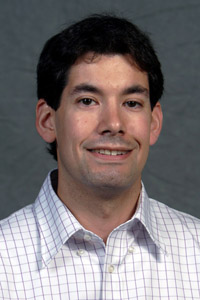 Caption: Maria C. Linder, professor of biochemistry and the director of Cal State Fullerton’s Howard hughes Medical Institute program, center, works with students in the lab. Photo by Patrick O’Donnell Download Photo
Caption: Maria C. Linder, professor of biochemistry and the director of Cal State Fullerton’s Howard hughes Medical Institute program, center, works with students in the lab. Photo by Patrick O’Donnell Download Photo
University Initiative: STEM
Real-World Science
Community College, High School Students Research Botulism Treatment
Nov. 9, 2011 :: No. 61
What:
Orange County community college and high school students will participate in three days of research experiences Nov. 12-13 and 19 as part of Cal State Fullerton’s Howard Hughes Medical Institute Weekend Research Program. Two local high school mathematics and science teachers have been selected to participate in the fall program.
Where:
Dan Black Hall, Cal State Fullerton
800 N. State College Blvd., Fullerton 92831
Why:
The weekend research program was established to excite young students’ interest in chemistry, biology and mathematics, and supports those who have little or no experience with, or knowledge of, research. It is part of university’s Howard Hughes Medical Institute-supported program to find and recruit more biomedical science researchers. Increasing student interest in the STEM fields of science, technology, engineering and mathematics is a university initiative. Participants immerse themselves in three days of in-depth work on an actual research question under the supervision of Cal State Fullerton faculty mentors.
 Caption: Nicholas T. Salzameda, assistant professor of chemistry and biochemistry. Photo by Karen Tapia Download Image
Caption: Nicholas T. Salzameda, assistant professor of chemistry and biochemistry. Photo by Karen Tapia Download Image
Weekend Focus:
Nicholas T. Salzameda, assistant professor of chemistry and biochemistry and an organic chemist, will lead the weekend program, which is directed at finding small organic molecules that would prevent the action of the potentially deadly, even in miniscule amounts, botulinum neurotoxin. Absorption by injection, inhalation and/or ingestion causes botulism. Most sources of the neurotoxin are from spoiled canned foods, but there is concern that it can be used as a biological weapon, Salzameda said.
Currently, there are no Food and Drug Administration-approved small molecule therapeutics for treatment or prevention of most strains of botulism, Salzameda explained. Discovering small molecule inhibitors for the botulinum neurotoxin could be developed into future therapeutics for the treatment of botulism, which is the research objective, Salzameda added.
Additional:
The program is funded by a $1.2 million grant awarded in 2008 to facultymembers in the departments of Biological Science, Chemistry and Biochemistry, and Mathematics. Maria C. Linder, professor of biochemistry, directs Cal State Fullerton’s Howard Hughes Medical Institute program.
Media Note:
To arrange interviews and photos, please contact Debra Cano Ramos, Public Affairs,
657-278-4027, 657-278-2414 or dcanoramos@fullerton.edu
Media Contacts:
Maria C. Linder, Chemistry and Biochemistry, 657-278-2472 or mlinder@fullerton.edu
Nicholas T. Salzameda, Chemistry and Biochemistry, 657-278-278-3594 or nsalzameda@fullerton.edu
Debra Cano Ramos, Public Affairs, 657-278-4027, 657-278-2414 or dcanoramos@fullerton.edu
